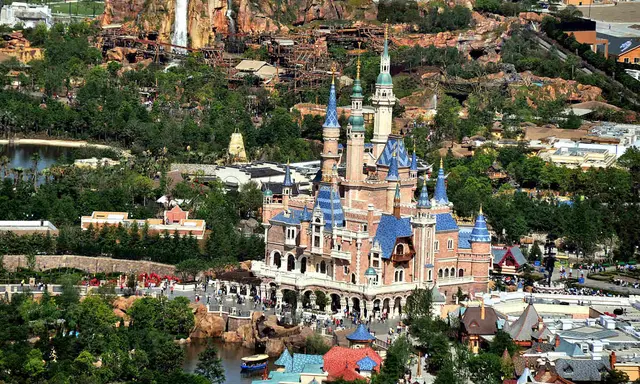As the country shifts its economy to rely more on domestic consumption, there could be a huge amount of room for more theme parks, but they would have to be good to survive the competition
Dozens of amusement and theme parks in various styles and motifs are springing up in China, giving rise to fears of an impending bubble in the property sector.
Be it the Disneyland in Shanghai, Water Park in Shenzhen or Hello Kitty Park in Anji, Zheijiang province, one can find facilities of various hue across the length and breadth of the country.
The latest developer to expand its theme park offerings is billionaire Wang Jianlin’s Dalian Wanda Group, which started work on its 11th “Cultural Tourism City” in Guilin, Guangxi province, on Friday. With three parks already running, the group targets to have 15 “Cultural Tourism Cities” by 2020.
Carnival Group International, another tourism property developer, said it plans to have more than 10 theme parks in next five years across China’s first- and second- tier cities. Its debut project, a large scale beachside theme park contains amusement facilities, observation wheel, cinema and other outlets, in China’s northern port city of Qingdao, is scheduled to open next month.
With China determined to boost domestic consumption, some analysts and industry experts believe that there is huge room for further theme park development, while others feel that only the tough will survive.
“Chinese holidaymakers are making more domestic trips due to the economic slowdown and the devaluation of the yuan,” said Jennifer So, a tourism analyst at China Securities International.
With the rise of the middle class, there has also been a sea change in preferences. Chinese consumers tend to be more interested in leisure, sightseeing and services instead of purely shopping. With central government policies remaining favourable, it could be the mainstay for higher domestic spending, So said.
Haichang Ocean Park, the largest marine theme park operator in China, has already gained from the growing demand and seen its net profit rise by 20 per cent last year.
Gao Jie, chief strategy officer at Haichang, said the company could reap the harvest now because it entered the industry as early as the 1990s and has already opened eight parks.
The operator targets to have four more parks open by 2020, including one under construction in Shanghai. Gao doesn’t anticipate any challenge from the Shanghai Disneyland resort which is slated to open in June. “We would have a cluster effect, like Hong Kong’s Disneyland and Ocean Park.” He noted Haichang’s advantage in having its own sea animals and a good knowledge of conservation practices.
The US-based consultancy Aecom expects China to surpass the US as the biggest theme park market in the world by 2020, drawing 221 million people by that time, nearly double the number last year.
Meanwhile, China is building parks faster than any other country in the world. Last year, 21 theme parks opened in China, with another 20 parks under construction. There are nearly 300 theme parks across the country, according to a eport.
Meng Cai, the executive director at Carnival, says China has enough room to support new parks as modern leisure facilities for families are in short-supply.
Meng said that tourism property developers who focus on selling properties rather than tourism, rarely succeed. Carnival, for instance, is transforming from a home developer to a tourism complex builder, that would rely on existing park revenue and co-funding for future development.
A number of traditional property developers are rushing to theme parks for business diversification. China Securities’ So said this used to happen in the 1990s and most of the theme parks went bankrupt at the time.
But she is less optimistic this time, believing that most firms would lose money. Intellectual property and management expertise is still the key for running theme parks which most of the developers don’t have, she said. In addition, there is also fierce competition from foreign giants. According to some reports, 80 per cent of the theme parks that were set up in the last 10 years have closed down.
A US$3.3 billion Universal Studios park is slated to open in Beijing in 2019 and a Six Flags park in Tianjin in 2018.
(SOUTH CHINA MORNING POST)
 简体中文
简体中文

